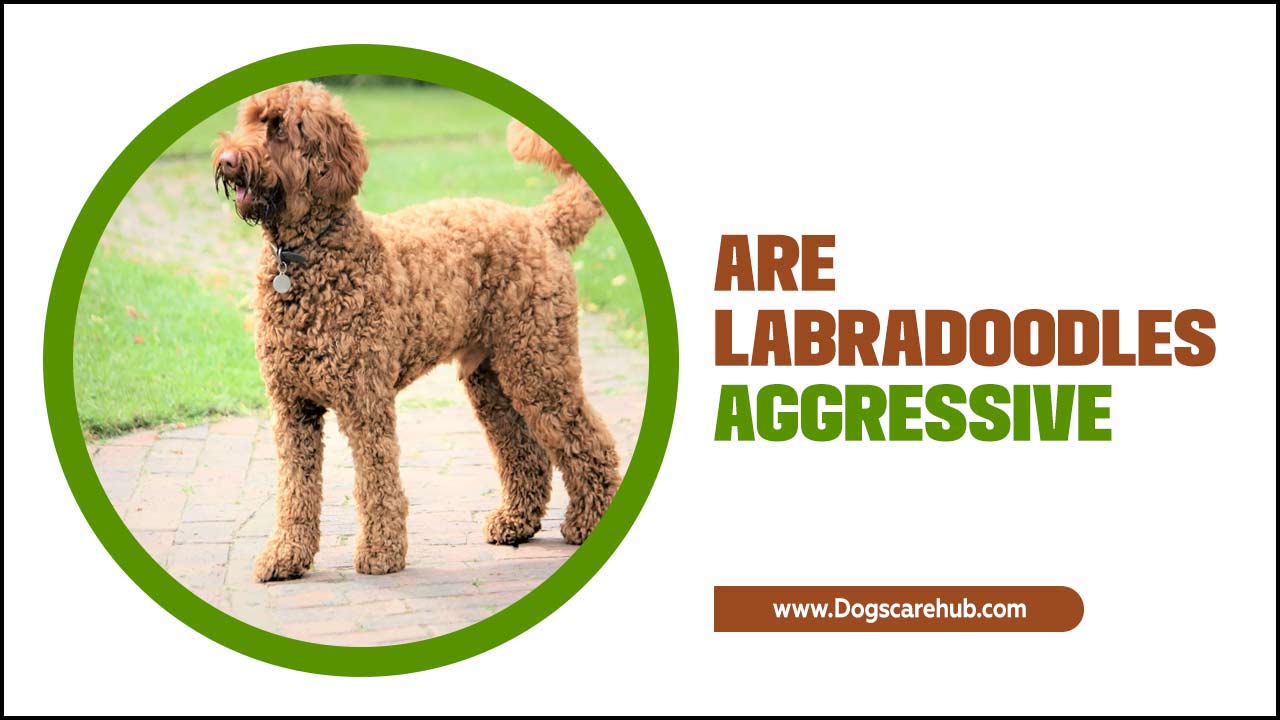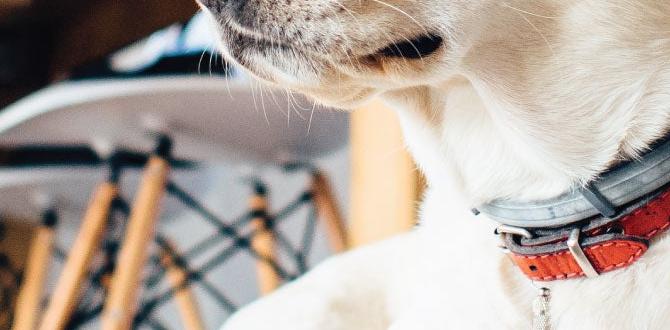As one of the most popular breeds in the world, Labradoodles are beloved for their friendly and affectionate personalities and adorable appearance.
However, despite their reputation as easy-going companions, some concerns have been raised about the breed’s potential for aggression. With their mixed heritage of Labrador Retriever and Poodle, many prospective owners wonder if Labradoodles may inherit any behavioural traits that could lead to aggressive tendencies.
As a result, it’s important to explore this topic in-depth to provide a complete guide on whether Labradoodles are aggressive. We aim to provide a comprehensive overview of Labradoodle temperament, including discussing common behavioural issues and how to address them. Are labradoodles aggressive? We will examine the factors influencing a dog’s aggressive tendencies, such as genetics, upbringing, and socialization.

What Is Dog Aggression?

Dog aggression refers to any behaviour displayed by a dog that is intended to cause harm or inflict injury on another animal or person. It is important to note that aggression in dogs can be influenced by various factors, including genetics, upbringing, socialization, and training.
While Labradoodles are generally known for their friendly and sociable nature, it is possible for any dog, including Labradoodles, to display aggression under certain circumstances. It is crucial for dog owners to understand the signs of aggression and seek professional help if they notice any concerning behaviours in their labradoodle or any other breed.
Characteristics Of Labradoodles
Labradoodles are a popular crossbreed between Labrador Retrievers and Poodles. These friendly and sociable dogs come in various sizes, coat types, and colours, making them visually appealing to many pet owners. Labradoodles are adorable but also intelligent and trainable, making them well-suited for roles such as therapy dogs or service animals.
However, it’s important to note that Labradoodles require regular grooming and exercise to maintain their overall health and well-being. As responsible dog owners, paying close attention to their needs and providing them with the appropriate care and attention they require is crucial.
- OFFICIAL NAME Labradoodle
- COMMON NAME Labradoodle
- PET HEIGHT 22 to 25 inches
- PET WEIGHT 50 to 75 pounds
- LIFESPAN 10 to 14 years
- GOOD WITH cats, children, dogs, families, seniors
- TEMPERAMENT friendly, gentle, outgoing, playful, protective, willful
- INTELLIGENCE high
- SHEDDING AMOUNT infrequent
- EXERCISE NEEDS medium
- ENERGY LEVEL active
- VOCAL LEVEL infrequent
- DROOL AMOUNT low
- BREED GROUP hybrid
- BREED SIZE medium (26-60 lbs.)
- COAT LENGTH curly, long, medium
- COLORS black, brown / chocolate/liver, cream, gold / yellow, red, white
- PATTERNS bicolor
- OTHER TRAITS apartment-friendly, cold weather tolerant, easy to groom, easy to train, good for first-time pet owners, good hiking companion, hot weather tolerant, loves water, low prey drive, requires lots of grooming, strong loyalty tendencies, tolerates being alone
Are Labradoodles Aggressive: What You Need To Know

Are labradoodles aggressive are generally known for their friendly and sociable nature? However, like any other dog breed, Labradoodles can exhibit aggressive behaviour if not properly trained or socialized. It is important to note that aggression in Labradoodles is not a common trait and is typically the result of specific circumstances or experiences.
Early socialization, proper training, and positive reinforcement can help prevent aggression in Labradoodles and ensure they grow up well-behaved and friendly companions. If you are considering getting a Labradoodle or already have one exhibiting aggressive behaviour, it is recommended to seek guidance from a professional dog trainer or behaviourist to address the issue effectively.
How To Prevent Aggression In Dogs?

Preventing aggression in dogs is an important aspect of responsible pet ownership. While Labradoodles are generally known for their friendly and affectionate nature, taking steps to prevent potential aggression is still essential. Remember that every dog is unique; individual factors such as genetics, past experiences, and health can also contribute to aggression.
By being proactive and taking these preventive measures, you can help ensure your labradoodle remains a happy and well-behaved companion. Here are some tips to help prevent aggression in dogs:
- Socialize Your Dog: Expose your labradoodle to various people, animals, and environments from a young age. This will help them become comfortable and well-adjusted in different situations.
- Training and Obedience: Consistent training can help establish boundaries and teach your dog appropriate behaviour. Positive reinforcement techniques can be particularly effective in preventing aggression.
- Provide Mental Stimulation: Boredom and frustration can contribute to aggressive behaviour. Ensure your labradoodle has plenty of toys, puzzles, and activities to stimulate them mentally.
- Supervise Interactions: Always closely supervise interactions between your labradoodle and other animals or people, especially if they are unfamiliar or have a history of aggression.
- Seek Professional Help if Needed: If you notice any signs of aggression in your labradoodle, it is essential to seek the help of a professional dog trainer or behaviourist who can provide guidance and support.
Dealing With An Aggressive Labradoodle
If you find yourself with an aggressive Labradoodle, seeking professional help to address the issue is crucial. One of the first steps in managing their behaviour is identifying the triggers and situations that provoke aggression. By understanding these factors, you can better control their aggressive tendencies.
Implementing a structured training program that focuses on positive reinforcement is an effective way to modify their behaviour. Creating a safe environment and setting boundaries for your Labradoodle can also prevent aggressive incidents.
Regular exercise and playtime are important for channelling their energy in a positive way. Remember, addressing aggression in Labradoodles requires patience, consistency, and the guidance of a professional.
How To Train A Labradoodle Not To Be Aggressive

Training a Labradoodle not to be aggressive requires consistency and patience. Positive reinforcement techniques, such as rewarding good behaviour, effectively shape their behaviour. Socializing your Labradoodle with other dogs and people from an early age can help reduce aggression.
Setting clear boundaries and providing structure through obedience training is crucial in curbing their aggressive tendencies. Seeking the guidance of a professional trainer or behaviourist can provide additional support in training a non-aggressive Labradoodle.
Remember to give close attention to their social familiarities and possessive attributes. By following appropriate solutions and implementing proper dog training methods, you can prevent aggressive behaviours in Labradoodles.
Things To Keep In Mind If You Are Adopting A Labradoodle
Before adopting a Labradoodle, it is essential to research the breed characteristics, including their needs and temperament. Ensure you have the time, resources, and commitment to care for a Labradoodle properly. Choose a reputable breeder or adopt from a reliable rescue organization to ensure the health and temperament of the dog.
Consider the size and exercise requirements of Labradoodles to ensure they align with your lifestyle. Proper socialization and training should be a priority when bringing a Labradoodle into your home. By following these guidelines, you can provide your Labradoodle’s loving and secure environment.
How To Raise A Non-Aggressive Labradoodle

To raise a non-aggressive labradoodle, starting socializing at a young age is important. This exposure allows them to interact with different people, animals, and environments. Positive reinforcement training methods should encourage good behaviour and discourage aggression.
Regular physical exercise and mental stimulation are essential to keep Labradoodles engaged and well-balanced. Setting consistent rules and boundaries helps establish clear expectations for your labradoodle.
If you encounter any signs of aggression or behavioural issues, seeking professional guidance from a veterinarian or dog trainer is advisable. By following these steps, you can ensure your labradoodle grows up to be a well-socialized and non-aggressive pup.
Advantages Of Having A Non-Aggressive Labradoodle

Having a non-aggressive Labradoodle comes with several advantages. Firstly, they make great companions for families and individuals, providing love and affection. Non-aggressive Labradoodles are likelier to get along with other pets and children, creating a harmonious and peaceful living environment.
Their easygoing nature makes them easier to train and socialize, allowing them to adapt to various situations. Building a strong bond with a non-aggressive Labradoodle also leads to a lifetime of love and companionship. With their friendly and non-threatening demeanour, owning a non-aggressive Labradoodle brings joy and peace of mind to any dog owner.
Disadvantages Of Having An Aggressive Labradoodle
Having an aggressive Labradoodle comes with its fair share of disadvantages. Firstly, an aggressive Labradoodle can pose safety risks to your family members, visitors, and other animals. Dealing with an aggressive Labradoodle requires additional time, effort, and resources for training and behaviour modification.
This may make them unsuitable for households with young children or other pets, as the potential risks could outweigh the benefits. The constant management and supervision required for an aggressive Labradoodle can be quite stressful for owners. Aggression in Labradoodles can also strain relationships with neighbours, friends, and the broader community.
Conclusion
Labradoodles, like any other dog breed, have their own unique set of characteristics. While aggression is not a common trait in Labradoodles, it is important to understand that individual dogs may exhibit different behaviours based on their upbringing and experiences.
It is crucial to provide proper training, socialization, and a nurturing environment to prevent aggression in Labradoodles or any other dog breed. By understanding the signs of aggression and taking proactive steps, you can raise a non-aggressive Labradoodle that is well-behaved and a joy to be around.
Remember, responsible dog ownership plays a significant role in ensuring your furry friend’s overall well-being and behaviour. So, if you are considering adopting a are labradoodles aggressive , make an informed decision and provide them with the care and love they deserve.
Frequently Asked Questions
1.Do Labradoodles Have Behavioural Issues?
Ans: Like any breed, Labradoodles can exhibit behavioural issues if not properly trained and socialized. These include separation anxiety, fearfulness, and aggression towards other dogs or people. Investing in training and socialization is crucial to prevent or address these issues. Additionally, choosing a reputable breeder that prioritizes temperament is essential.
2.Why Does My Labradoodle Growl At Me?
Ans: Labradoodles may growl at their owners for various reasons. Growling is a form of communication, and it can indicate fear, threat, or territorial protection. It’s important to observe your dog’s body language and consider seeking professional help if the behaviour persists.
3.At What Age Do Labradoodles Calm Down?
Ans: Labradoodles generally start to calm down around 2-3 years old. However, proper training, socialization, and daily exercise are crucial in reducing their hyperactivity. It’s important to remember that each Labradoodle has a unique temperament, so some may naturally be calmer even at a younger age.
4.Are Labradoodle Good Family Dogs?
Ans: Labradoodles make excellent family dogs due to their friendly and affectionate nature. They are easy to train and get along well with children and other pets. However, proper socialization and training are essential to prevent potential behavioural issues.
5.What Is The Temperament Of A Labradoodle?
Ans: Labradoodles are known for their friendly and sociable nature, making them great family pets. They get along well with children and other animals. These intelligent dogs are easily trainable, although individual temperament can vary based on genetics and upbringing.
Meet Elyse Colburn, the devoted canine companion and storyteller behind the enchanting world of “Tales, Tails, and Adventures Unleashed.” A passionate dog enthusiast with a heart full of paw prints, Elyse Colburn shares heartwarming tales and insightful adventures, celebrating the joy, loyalty, and endless antics that make every dog a true hero. Join Elyse Colburn on this tail-wagging journey, where every post is a love letter to our four-legged friends.








